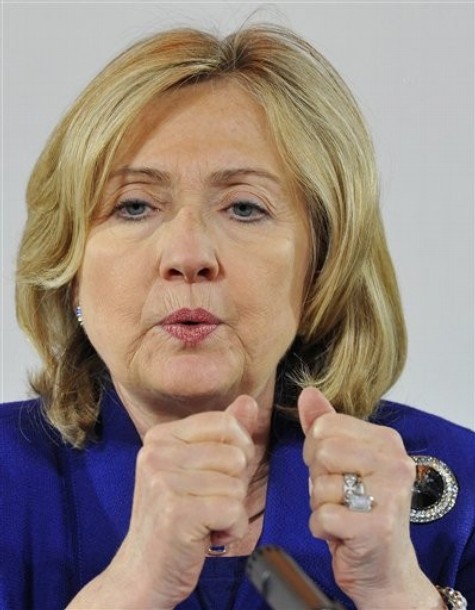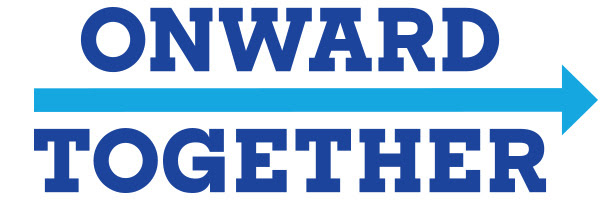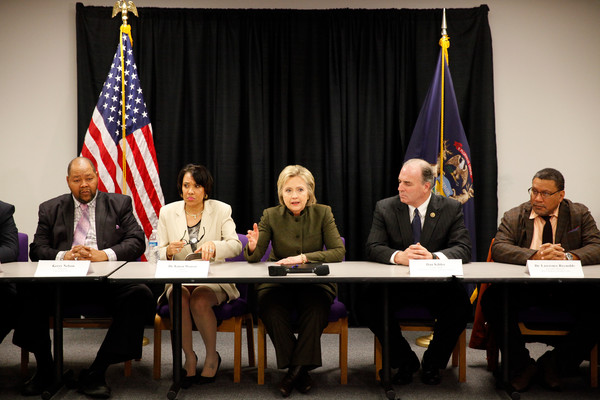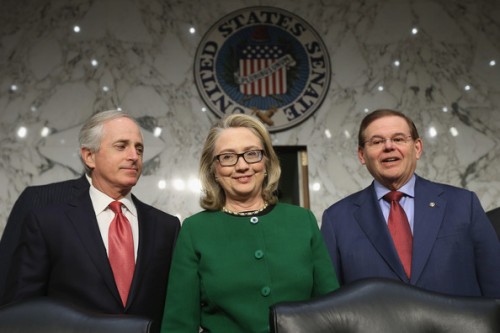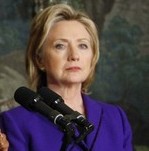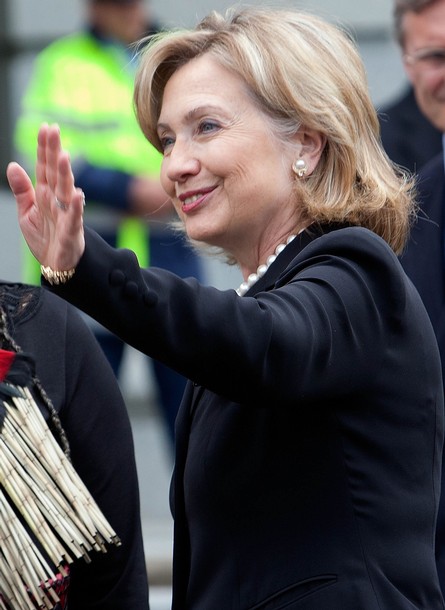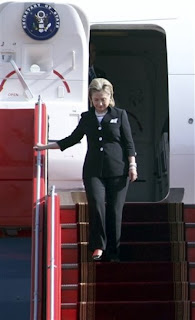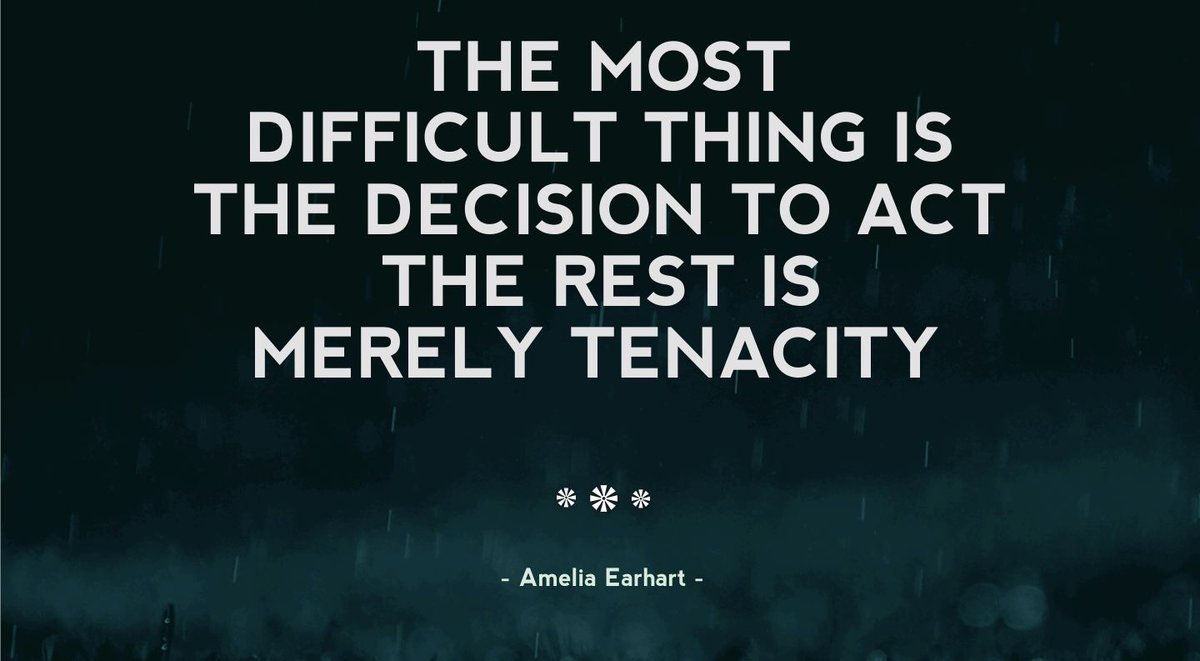Remarks After the International Conference on the Libyan Crisis
Remarks
Hillary Rodham Clinton
Secretary of State
Foreign and Commonwealth Office
London, United Kingdom
March 29, 2011
Vodpod videos no longer available.
SECRETARY CLINTON: All set? I apologize for my voice.
Good afternoon and I want to begin by expressing certainly our gratitude to the prime minister and the foreign secretary and the entire government for hosting this important conference. I’ve just concluded a very full day of business covering an array of issues with a broad range of counterparts.
I began the day with a meeting with Dr. Jibril and two other representatives of the Libyan Transitional National Council to hear their perspective on the situation in Libya. We talked about our efforts to protect civilians and to meet humanitarian needs and about the ongoing coalition military action in support of Resolution 1973. We also discussed the need for a political solution and transition in Libya, and I reiterated the support of the United States on behalf of President Obama for the legitimate aspirations of the Libyan people, and our commitment to helping them achieve those aspirations.
I also had the opportunity to meet with both Prime Minister Cameron and with Foreign Minister Hague. I expressed the United States’ gratitude for the critical leadership that the United Kingdom has shown in building an effective international response to the crisis in Libya. We consulted on the way forward, the military, political, and humanitarian dimensions. And we also discussed events and broader trends across the Middle East and North Africa and our joint efforts in Afghanistan and Pakistan.
I had the opportunity also to consult with a number of other counterparts about Libya because today’s conference is taking place at a moment of transition, as NATO takes over as leader of the coalition mission, a mission in which the United States will continue to play an active, supporting role. Some of our coalition partners announced additional support and contributions today, which we welcomed.
In addition to our joint military efforts, we discussed the need for progress in Libya along the three nonmilitary tracks: First, delivering humanitarian assistance; second, pressuring and isolating the Qadhafi regime through robust sanctions and other measures; and third, supporting efforts by Libyans to achieve the political changes that they are seeking.
We also agreed on a structure for decision making going forward on both the military and political tracks. On the military side, we agreed that the North Atlantic Council with coalition partners fully at the table will be the sole provider of executive direction for NATO operations, similar to the ISAF approach for Afghanistan. On the political side, we agreed to establish a contact group to offer a systematic coordination mechanism and broad political guidance on the full range of efforts under Resolutions 1970 and 1973. And as I’m sure you just heard from the prime minister of Qatar, Qatar has agreed to host the first meeting of the contact group, along with the UK.
In a series of side meetings, I also had the chance to discuss a number of issues, including Syria. I expressed our strong condemnation of the Syrian Government’s brutal repression of demonstrators, in particular the violence and killing of civilians in the hands of security forces. I also discussed efforts that are undertaken by the Organization of the Islamic Conference, particularly our joint effort to pass a resolution at the Human Rights Council that promotes tolerance and respect as well as free expression. And we greatly appreciate the OIC hosting a meeting of the International Contact Group on Afghanistan and Pakistan in Jeddah. I was also able to consult on a number of regional matters, including, of course, Libya with Foreign Minister Davutoglu of Turkey.
So it was a full day for all of us. We came to London to speak with one voice in support of a transition that leads to a brighter future for the Libyan people. I’m very pleased with the progress that we have made both today and in the days preceding it, and grateful for everyone who participated in the conference and in the broader effort in Libya. I think we are making a lot of progress together, and we could not do it unless we were representing the international community as we are.
So with that, I’d be happy to take your questions.
MODERATOR: Our first question is from Andy Quinn of Reuters.
QUESTION: Madam Secretary, in your meeting today with Dr. Jibril, I was wondering, were you able to make any concrete offers of assistance to them, either through turning over the $33 billion in Libyan funds that have been frozen in the United States, or in discussing possible arms transfers?
And Admiral Stavridis told the Senate today that intelligence shows flickers – he called – he used the word “flickers” of al-Qaida in the Libyan opposition. How great a concern is that? And is that part of the U.S. debate over any potential arms transfers to the transitional council?
SECRETARY CLINTON: Well, Andy, first of all, we have not made any decision about arming the rebels or providing any arms transfers, so there has not been any need to discuss that at this point. We did discuss nonlethal assistance. We discussed ways of trying to enable the Transition National Council to meet a lot of their financial needs and how we could do that through the international community given the challenges that sanctions pose but recognizing that they obviously are going to need funds to keep themselves going. We discussed a broad range of matters and certainly their presentation, which some of you may have seen earlier today, as to what kind of civil society and political structure they are trying to build in Libya are exactly in line with what they have consistently said were their goals. Their commitment to democracy and to a very robust engagement with people from across the spectrum of Libyans is, I think, appropriate. We do not have any specific information about specific individuals from any organization who are part of this, but of course, we’re still getting to know those who are leading the Transitional National Council. And that will be a process that continues.
MODERATOR: Our next question is from Sam Coates of the Times of London.
QUESTION: Two things. First of all, is it your understanding that the UN Resolution 1973 makes it illegal to supply arms to the Libyan rebels, or do you think there could be some room for maneuver of that should it get to that?
And secondly, it’s quite striking when the rebels were talking earlier today, none of their names are public apart from three or four of the 30-odd of them, and they clearly have access – they have quite a lot of power and access to a lot of funds through oil money. Do you think that they should be more transparent in terms of declaring who they are, where they’re from, what kind of groupings they come from, and how they’re using the money?
SECRETARY CLINTON: Well, as to the first question, it is our interpretation that 1973 amended or overrode the absolute prohibition of arms to anyone in Libya so that there could be legitimate transfer of arms if a country were to choose to do that. As I said, we have not made that decision at this time.
Secondly, I do think that greater transparency will, of course, be expected and will be delivered. But I think you have to put this into context. I mean, this is a very fast-evolving, but by no means settled, structure that they are trying to build. They also claim to have a number of people who are willing to work with them from central and western Libya who, for security reasons, cannot yet be named.
So I do think that this is a work in progress. And just as with respect to Andy’s question, we don’t know as much as we would like to know and as much as we expect we will know. We’re picking up information. A lot of contact is going on, not only by our government but many governments that are part of the coalition. So we’re building an understanding, but at this time, obviously, it is, as I say, a work in progress.
MODERATOR: Jay Solomon of the Wall Street Journal.
QUESTION: Thank you. I have a question regarding Syria. Over the weekend, you gave an interview where you said how many members of Congress viewed President Asad as a reformer. Is that your position? Because you know there’s been well-documented cases of Syrian support for terrorist groups, allegations it’s pursued atomic weapons, and some in Congress said that Syria actually poses a greater threat to the United States – its national security – than Libya does. Is it the Obama Administration’s position now that it can work with President Asad to instigate or initiate some of the reforms that its people are clearly calling for? Thank you.
SECRETARY CLINTON: Well, first, Jay, as you rightly pointed out, I referenced opinions of others. That was not speaking either for myself or for the Administration. We deplore the crackdown that is occurring in Syria and we call on Syria, as we have throughout the last months, to respect the rights of its citizens, to allow people to protest peacefully, to work toward political and economic reform that would be to the benefit of the Syrian people.
So there is no difference in how we view this than how we have viewed the other incredible sequence of actions that we’ve seen in North Africa and in the Middle East. And we hope that there is an opportunity for reform. We hope there’s an opportunity for reform in all of these countries. We want to see peaceful transitions. We want to see democracies that represent the will of the people.
So I think that we’re, like the Syrian people, waiting and watching to see what comes from the Syrian Government. They dismissed the cabinet today, which resigned en masse. And as we have said so many times before, we support the timely implementation of reforms that meet the demands that Syrians are presenting to their government, such as immediately eliminating Syria’s state of emergency laws, which has been in effect for a long time.
It is up to the Syrian Government, it is up to the leadership, starting with President Bashir Asad, to prove that it can be responsive to the needs of its own people. So we’re troubled by what we hear, but we’re also going to continue to urge that the promise of reform, which has been made over and over again and which you reported on just a few months ago – I’m a reformer, I’m going to reform, and I’ve talked to members of Congress and others about that, that we hear from the highest levels of leadership in Syria – will actually be turned into reality. That’s what we’re waiting and watching for.
MODERATOR: And the final question from Duncan Gardham of the Daily Telegraph.
QUESTION: Hi, I wondered how you view the situation in Libya at the moment. There seems to be a bit of almost ping-pong going on. The rebels seem to be withdrawing from some areas today. How do you see the situation evolving in Libya? How long do you see it lasting? And if you’re talking to Qadhafi, what are his options? He can obviously try and stay or he can face the ICC, but is there a third option where he could travel to another country?
SECRETARY CLINTON: Well, first, I think that what we are seeing in Libya is a strengthening of the opposition, a consistent and very persistent effort by the opposition to try to hold ground which they have had and to regain ground which they have lost. Unfortunately, we are also seeing with Qadhafi a continuing pressure on the rebels, on his people, a willingness to use force. We had reports today of continuing military action by Qadhafi’s forces in Misrata and elsewhere. So this is a volatile, dynamic situation that is unfolding.
We accomplished a lot in a very short period of time. We clearly believe, as President Obama said last night, that we prevented a massacre in Benghazi, that we were able to stop the military advance that was moving rapidly from west to east, and that we sent a clear message through the international community’s willingness to enforce a no-fly zone and protect civilians that that kind of ruthless behavior by a leader toward his own people would not be tolerated. This has happened so quickly that we’re now facing questions like the ones you ask, but I’m not sure that we know exactly when we will get to any change in attitude by Qadhafi and those around him.
As you know, there’s a lot of reaching out that is occurring, a lot of conversations that are going on, and as the Arab League has said, it’s also obvious to everyone that Qadhafi has lost the legitimacy to lead. So we believe he must go. We’re working with the international community to try to achieve that outcome. He will have to make a decision. And that decision, so far as we’re aware, has not yet been made.
You probably know that the secretary general’s special envoy will be going to Tripoli and Benghazi, once again to urge Qadhafi to implement a real ceasefire that is not going to be immediately breached by his own forces, to withdraw from those areas that he has taken by force, and to look for a political resolution, which could include his leaving the country. So, I mean, all of this is in play. And many of the nations that were here in London today are working together to try to gather information, to share the impressions each has with the conversations that are coming from Tripoli and from those close to Qadhafi about what is or isn’t being considered.
So I expect to see things continue to move in a positive direction. But I can’t by any means give you any sort of timeline. That is just not sensible at this point. We don’t have enough information to do that.
MODERATOR: Thank you all very much.










